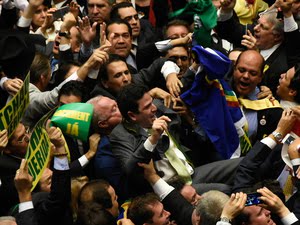

Brazilian President Dilma Rousseff said Monday she would fight on in the face of a vote by lawmakers to impeach her that has plunged her government into its deepest crisis yet.
Speaking publicly for the first time since 367 members of the country’s lower Chamber of Deputies voted to impeach her Sunday, Rousseff called the vote a “coup d’etat.”
“It uses the appearance of a legal and democratic process to perpetrate a crime, which is injustice,” she said.
The former guerrilla, who was tortured during Brazil’s 1964-85 military dictatorship, said she was “having tortured dreams” since the vote.
“They will not kill my hope, because I know that democracy is always on the right side of history,” Rousseff said.
She vowed to continue to “fight as I have for my whole life.”
More than two-thirds of Brazil’s lower house voted in favour of impeaching Rousseff on charges of budget and campaign finance irregularities. Only 137 voted against.
The decision means that Brazil’s Senate could now suspend Rousseff from office for 180 days with a simple majority vote expected later this month.
Rousseff has been under pressure to resign for months, accused by opposition lawmakers of hiding the extent of the budget deficit during her re-election campaign at the end of 2014.
Rousseff and her supporters have called the impeachment vote an attempted coup, and point out she has not been charged with any crime.
Her approval rating, currently at only 10 per cent, has been battered by recession, as Brazil’s resource-dependent economy took hits from a bust in commodities markets and slowing global economy. Unemployment rose to 9.6 million workers in 2015.
Rousseff has been entangled in a massive corruption scandal at state oil corporation Petrobas that has implicated hundreds of parliamentary deputies and more than half of the Senate.
Rousseff headed Petrobras’ board from 2003-10. She has not been directly implicated in the scandal, but her attempt last month to appoint as her cabinet chief former president Ignacio Lula da Silva, who is under formal investigation, backfired in the face of allegations that she wanted to shield him from prosecution.
Under investigation in the Petrobras scandal is Chamber of Deputies Speaker Eduardo Cunha, who led the calls for Rousseff’s impeachment. Cunha is accused of taking 5 million dollars in bribes linked to a Petrobras contract.
The impeachment debate took place less than four months before the Olympic Games open August 5 in Rio de Janeiro. The International Olympic Committee said Monday it was not concerned about a potential impeachment’s impact on the Olympics.
“The preparations for the Olympic Games are now in a very operational phase, in which this type of political problem has much less influence than at other levels of organization,” an IOC spokesperson told dpa.
If the Senate votes to proceed with impeachment, Vice President Michel Temer will take power while the Supreme Court investigates the charges against Rousseff.
The Senate would then require a two-thirds majority at a final vote in October to remove Rousseff from office permanently.
Brazilian media reports suggested that a majority of senators were prepared to vote for suspension.
Temer was already making plans for a new government, the Folha de Sao Paulo daily reported Monday.
[SOURCE:- DPA]



